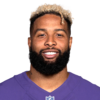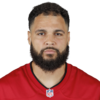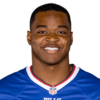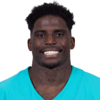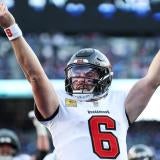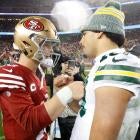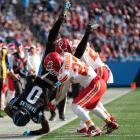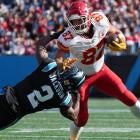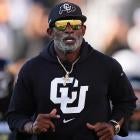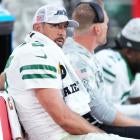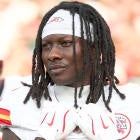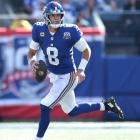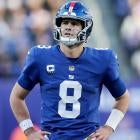
It's top-10 week here at CBSSports.com. On Monday, my colleague Sean Wagner-McGough walked through the top 10 quarterbacks. On Tuesday, Patrik Walker unveiled the top 10 running backs. In the space below, we'll reveal the top 10 wide receivers.
So, the natural question here: Is this is a ranking of the league's best receivers in a vacuum, or the receivers we expect to have the best 2020 seasons?
To those questions, I would simply say: "Yes." It's our attempt to combine those things as best we can, taking a look at how each of the league's best wideouts has performed in their current role, the context surrounding that performance, all kinds of narrower statistics to highlight different parts of their respective skill sets, what we can expect from them in the 2020 season, and more.
The deepest of apologies go out to our final cuts (in alphabetical order): Stefon Diggs, Kenny Golladay, Cooper Kupp, Tyler Lockett, Allen Robinson, and Robert Woods. Realistically, you could swap out any of the players from 6 to 10 on our board for any one of them and I wouldn't argue very much. They're all that close.
Without further ado ...
10. Odell Beckham Jr., Browns
I know this seems a bit crazy at first glance. But consider this: over the past three seasons, Beckham is carrying per-16-games averages of 88 catches, 1,194 receiving yards, and six touchdowns. That's what he did in what are universally considered "down" years; with Eli Manning and Baker Mayfield playing what could only be described as terrible football; and with Beckham himself suffering a string of injuries that either kept him out for extended time (2017 and 2018) or meant he played hobbled for the entire season (2019), and which limited him to only 32 of 48 possible games during that span.
It's clear that Beckham has a ceiling that is much higher than what we've seen from him over these past three seasons, as he showed by averaging 107-1,534-13 on a per-16-games basis during his first three years in the league. If he can stay healthy and get something resembling competent quarterback play, he's a clear-cut top-five wideout.
The injuries are largely what's been keeping him from reclaiming that perch, though it's notable that his yards per route run average has dipped from 2.46 during his first three NFL seasons to 2.02 over the past three, per Pro Football Focus. The latter figure is still good enough to rank inside the top quartile of moderate-to-high volume receivers in the league in most seasons, though; and it's also better than what any of Diggs (1.98), Golladay (1.95), Lockett (1.97), Robinson (1.77), or Woods (1.90) have averaged in their current roles. Beckham's figure trails that of Kupp (2.11) but Beckham has handled larger volume (149 targets per 16 games vs. 116 for Kupp) and, despite Jared Goff's struggles last season, has undoubtedly dealt with worse QB play as well.
2020 Outlook: Beckham should benefit from improved quarterback play in 2020, if only because it's difficult to imagine Mayfield being worse than he was a year ago. With new coach Kevin Stefanski presumably installing a system that is far more in line with the style Mayfield played during his terrific rookie season, it's not difficult to envision a similar bounce back for Beckham, who has had plenty of time to recover from the various maladies that bothered him last season.
9. Chris Godwin, Buccaneers
Godwin is coming off a monster season in which he racked up an 86-1,333-9 line in just 14 games. He essentially took on co-No. 1 duties along with Mike Evans, drawing 121 targets to Evans' 118. (Evans played 13 games.) Godwin looked extremely comfortable in the role, registering career-best figures in yards per game, per catch, and per target, while also hauling in 71 percent of the passes thrown in his direction, the 10th-best mark among 38 players who were targeted at least 100 times last season.
Godwin did most of his work in the slot, aligning there on 63 percent of his routes, per Pro Football Focus. His 50 receptions from the slot tied for ninth-most in the NFL, while his 838 receiving yards out of the slot were second-most in the league behind only Kupp. Among 47 wideouts who ran at least 150 slot routes, Godwin's yards per route run average ranked fourth-best. He also did an excellent job establishing himself as a deep threat, catching 10 of 17 passes thrown his way that traveled at least 20 yards in the air. That 59 percent catch rate ranked fourth-best among 58 receivers who drew at least 10 deep targets.
It's entirely possible that Godwin shoots up this list even further with his performance in 2020, but he has just a one-season track record as a truly elite contributor, and he was not quite as effective when aligned on the outside as he was in the slot. As such, a place in the back half of the top-10 felt appropriate.
2020 Outlook: With Tom Brady arriving in Tampa, Godwin could move ahead of his star teammate in the pecking order, as Brady has shown a propensity to favor slot receivers and shorter, quicker routes with most of his targets. Godwin will also benefit from Rob Gronkowski and O.J. Howard occupying defenders up the seams, allowing him more space to operate in those intermediate areas of the field.
8. Keenan Allen, Chargers
A few years ago, it was looking like Allen might just be one of those guys who would never stay healthy. After kicking off his career with back-to-back 70-plus-catch seasons, Allen played only nine games in the final two years of his rookie deal. He suffered a lacerated kidney that caused him to miss eight games in 2015, then tore his ACL in his first game back in 2016.
All he's done since is solidify himself as one of the most consistently excellent receivers in the league. His season-long lines over the past three years: 102-1,393-6 in 2017; 97-1,196-6 in 2018; and 104-1,199-6 in 2019. See what I mean? Consistency.
Perhaps the best route-runner in the NFL, Allen is seemingly always open. His 68 percent catch rate over the past three seasons is one of the best in the league among high-volume players, and while he tends to run shorter routes than some of the other true No. 1 guys (12.5 yards per reception from 2017 through 2019), he makes up for it with his efficiency. Allen has averaged 2.34 yards per route run over the past three seasons, a better figure than several players who finished ahead of him on this list.
2020 Outlook: Allen will probably see his counting numbers take a dip in 2020, simply because the Chargers will likely be a bit run-heavier than they have been in the past now that Tyrod Taylor is under center rather than Philip Rivers. But Taylor has historically been something of a conservative passer, which means he is likely to favor targeting Allen and Austin Ekeler over Mike Williams and Hunter Henry. So while he may not see as much pure volume, Allen could conceivably see a larger target share than he has in even these past three seasons.
7. Mike Evans, Buccaneers
Evans has been a star from the moment he stepped on an NFL field. He's carrying career per-16-games averages of 82 catches, 1,291 yards, and nine touchdowns, and a strong 2.18 yards per route run average. (He's played 90 of 96 possible games.) He's one of the league's premier deep threats, catching at least seven passes thrown 20-plus yards in the air in each of his six seasons, and scoring at least three touchdowns on deep throws in four of those six campaigns.
The only real knock on him is his catch rate, which is very low at only 55.3 percent. That pales in comparison to just about every other player on this list. While some of that is due to the fact that Evans draws so many downfield targets, he's also dropped 44 passes in his career, giving him a drop rate of about 5.3 percent. (It's nearly equal to his 5.7 percent touchdown rate.)
Still, Evans' ability to handle incredible volume (148 targets per 16 games), create plays downfield (26 touchdowns on deep throws), and maintain per-route consistency and excellence despite wildly inconsistent quarterback play from the likes of Josh McCown, Mike Glennon, Jameis Winston, and Ryan Fitzpatrick throughout his career, all combine to make him a surefire star.
2020 Outlook: Evans will benefit from Brady simply being a more accurate passer than Jameis Winston, but he'll likely see something of a decrease in volume in 2020 due to Brady's willingness to take easy completions over forcing the ball downfield. Brady hasn't had an Evans-caliber deep threat since the days of Randy Moss, but the idea that he's going to suddenly become a downfield chucker seems a bit far-fetched.
6. Amari Cooper, Cowboys
I can hear the complaints already. Cooper ahead of Evans? Really?
Well ... for his career, Evans averages an 82-1,291-9 line per 16 games. Since arriving in Dallas, Cooper has averaged 84-1,225-9 per 16 games, and he's done it on considerably lower target volume. (He's played all 25 games.) He's also got a much higher catch rate (67.2 percent), so even though his yards per catch average (14.6) trails that of Evans, he's still been a bit more efficient on a per-route basis (2.24 yards per route run). That advantage holds even if you take out Evans' rookie season, where he was something of a co-No. 1 option alongside Vincent Jackson.
Cooper's sporadic injury issues have affected him only slightly since being traded to the Cowboys, and his once sky-high drop rate has fallen from 6.4 percent in Oakland to 4.6 percent in Dallas. It also seems far more likely that the strange home-road splits Cooper has exhibited in Dallas are the result of a small sample than something we should expect to continue into the future, considering he did not display the same splits during his time with the Raiders. (Those splits are also affected by the fact that he played only three snaps in one of his 12 Dallas road games. They're not quite as dramatic if you take that game out of the equation.)
Cooper's arrival also hastened the breakout of Michael Gallup, who has been able to take advantage of opposing No. 2 corners while working opposite his star teammate. Gallup is more of a pure X receiver than Cooper, who has the flexibility to move around, and he's benefitted from having someone to draw attention away from the boundary.
2020 Outlook: With offensive coordinator Kellen Moore remaining in place under new head coach Mike McCarthy, and with CeeDee Lamb joining Cooper and Gallup in three-receiver sets, Cooper could be operating in more space than ever before, while also perhaps playing in the pass-heaviest offense of his career. Considering his chemistry with Prescott, that seems like the recipe for a monster season.
5. Davante Adams, Packers
Since taking over as Green Bay's No. 1 wideout in 2016, Adams has averaged 96-1,197-11 on a per-16-games basis. (He's played 57 of 64 possible games.) He reached double-digit touchdowns in three of those four seasons, with his injury-marred 2019 campaign being the only one where he did not score 10 or more. The year he had in 2018 was legitimately one of the best wide receiver seasons in NFL history. He went for 111-1,386-13 (in just 15 games), putting him in a club that counts only Jerry Rice, Randy Moss, Antonio Brown, Isaac Bruce, and Herman Moore as its other members.
He and Aaron Rodgers have remarkable chemistry, particularly on the kinds of perimeter isolation routes which have long been a staple of their offense. Adams is one of the best in the league at working the sideline and using his body to shield off defenders to catch back-shoulder throws, and he is a consistently reliable red zone target, which has kept him at or near the top of the touchdown leaderboards.
Adams has not been quite as effective on a per-route basis (1.92 yards per route run from 2016 through 19) as the other top wideouts in the league, but his combination of volume (150 targets per 16 games), catch rate (64 percent), and touchdown production (nobody has more receiving scores in the past four years) keep him in the top-five mix.
2020 Outlook: Adams should presumably be healthier in 2020 than he was in 2019, and with the Packers not adding much in the way of pass-catching talent to their roster, he could be in line with an even larger target share than ever before. He's the only wideout on the roster who has more than a smidgen of Rodgers' trust, and Rodgers has shown plenty of willingness to direct the ball his way as often as possible in the past. Green Bay does look interested in pursuing a bit more of a run-heavy approach, however, and Matt LaFleur's tendency to call run plays near the goal line, in particular, could mean the dip in touchdown production he saw last season sticks around.
4. DeAndre Hopkins, Cardinals
Hopkins is the only player on our list who is moving to a new team in 2020, but considering how consistently he produced at a high level no matter who he had under center in Houston, making the transition from Deshaun Watson to Kyler Murray should not be an issue.
In his three seasons as the clear-cut No. 1 wideout prior to Watson's arrival, Hopkins averaged 88-1,228-7 per 16 games (while playing all 48), with his overall numbers weighed down by a 56.4 percent catch rate that was largely the result of horrific quarterback play. His quarterbacks during that time: Brock Osweiler, Brian Hoyer, Tom Savage, Ryan Fitzpatrick, Ryan Mallett, Case Keenum, Matt Schaub, T.J. Yates, and Brandon Weeden. Yes, that list is exactly as horrifying as it looks.
In Watson's three seasons, Hopkins saw a slight uptick in his target average, but a huge leap in his production: 110-1,431-11 per 16 games, with a 64.7 percent catch rate. (He played 46 of 48 possible games.) Hopkins averaged a fantastic 2.30 yards per route run during that same span, and no player in the NFL caught more touchdown passes during that time. Hopkins' insane body control and catch radius make him one of the best contested-catch guys in the league, and he is an excellent receiver both deep down the field and in tight spaces underneath where he needs to use his body to shield off closing defenders.
2020 Outlook: Playing in a more progressive system in Arizona than he ever did in Houston, Hopkins should operate in more open space than ever before. However, he might also see a bit less volume, simply because the way Kliff Kingsbury's offense works encourages spreading the ball around to different targets, while the Texans were often content to force-feed Hopkins. Still, he should be able to get down the field more often than he did last year, when the Texans dramatically altered his role and turned him into more of a pure possession receiver.
3. Tyreek Hill, Chiefs
Put simply, Hill is the most explosive player in the NFL.
In his three years as a full-time wideout, he has averaged an 82-1,311-10 line on a per-16-games basis (he's played 43 of 48 possible games), as well as 2.45 yards per route run. He's at an even 16 yards per reception during that span, the sixth-best mark in the league among players with at least 100 catches during that time. (His 10.64 yards per target lead the league.)
Hill also has 10 receiving touchdowns of 50-plus yards since 2017. Cooper, Diggs, and DeSean Jackson are in a three-way tie for second place, with just five apiece. Hill is a dynamic rushing threat as well, with 71 career carries for 500 yards and four touchdowns. He's the most dangerous player in football with the ball in his hands, whether that be on quick screens or jet sweeps or when he breaks into the open field. He and Patrick Mahomes are a wonderful match of skill sets, with Mahomes able to make any throw in existence and Hill able to find space anywhere on the field, at any time. If they're not the best scramble-drill duo in the league, it's only because Russell Wilson and Tyler Lockett have to do that dance more often due to the relative inadequacy of Seattle's offensive line.
2020 Outlook: I mean, just an absolute ton of big plays and touchdowns, probably. Mahomes + Hill + Andy Reid = Points.
2. Julio Jones, Falcons
Jones is the yards per route run king. Among wideouts with 50-plus targets, Jones has ranked first, fourth, first, first, first, first, and fifth over the past seven seasons. That is completely insane. They should just name the stat after him at some point.
Even during the three seasons since his last First Team All-Pro appearance (2017 through 2019) he leads the NFL in yards per route run, with a 2.80 average. His per-16-games average during that time is 102-1,537-6, with a 63 percent catch rate. (He's played 47 of 48 games.) The ridiculous touchdown concerns should have been written off immediately when they first surfaced, considering he he scored eight, 10, six, eight, and six times during his first five healthy seasons, but hopefully his 14 scores over the past two years put them to bed for good.
Jones is a massive target at 6-3, 220 pounds and is still an excellent downfield threat, and it's really only his decline in yards per reception (17.0 -> 16.4 -> 14.8 -> 14.1) and per target (10.9 -> 9.8 -> 9.9 -> 8.9) over the past several years that keeps him out of the No. 1 spot. (Though I wouldn't put up much of an argument if you flipped him and the guy we have there now.)
2020 Outlook: Jones will remain Matt Ryan's No. 1 target, and with Austin Hooper leaving in free agency he could even see his target share expand. Calvin Ridley is a strong No. 2 wideout but not particularly threatening to Jones' status as the top dog in this offense. Atlanta's defense is also likely to remain an issue, so there should be plenty of volume for Jones once again.
1. Michael Thomas, Saints
Thomas somehow just keeps getting better. In four seasons, he has gone for 92-1,137-9 (2016), 104-1,245-5 (2017), 125-1,405-9 (2018), and 149-1,725-9 (2019). He just set a record for receptions in a season, leading the league for the second consecutive year.
He is as automatic as it gets when the ball is thrown in his direction, boasting an absolutely hilarious 78.1 percent career catch rate that has jumped to 82.5 percent over the past two years. He's been slightly less efficient than Jones on a per-route basis (2.65 yards per route run over the past three years) but ever-so-slightly better at creating first downs (50.5 percent of his targets have resulted in first downs, compared to 47.4 percent for Jones) and touchdowns, which is ultimately why he got the nod here.
He is the best in the league out of the slot, the best in the league on slants and hitches, his hands are made of stick-um, he's got terrific size (6-3, 212 pounds) and strength (78th percentile in the bench press at the combine), elite change-of-direction skills, out-of-control footwork ... basically, he's got everything.
2020 Outlook: A lot of targets. (Seriously, a lot.) A lot of catches. (Probably more than anyone else in the league.) Very few balls that hit the ground. (Maybe like 20 or 30 at most.) A whole lot of 10 to 12-yard gains with cornerbacks hanging on his shoulders while he hauls the ball in anyway. (Several of these per game.)


